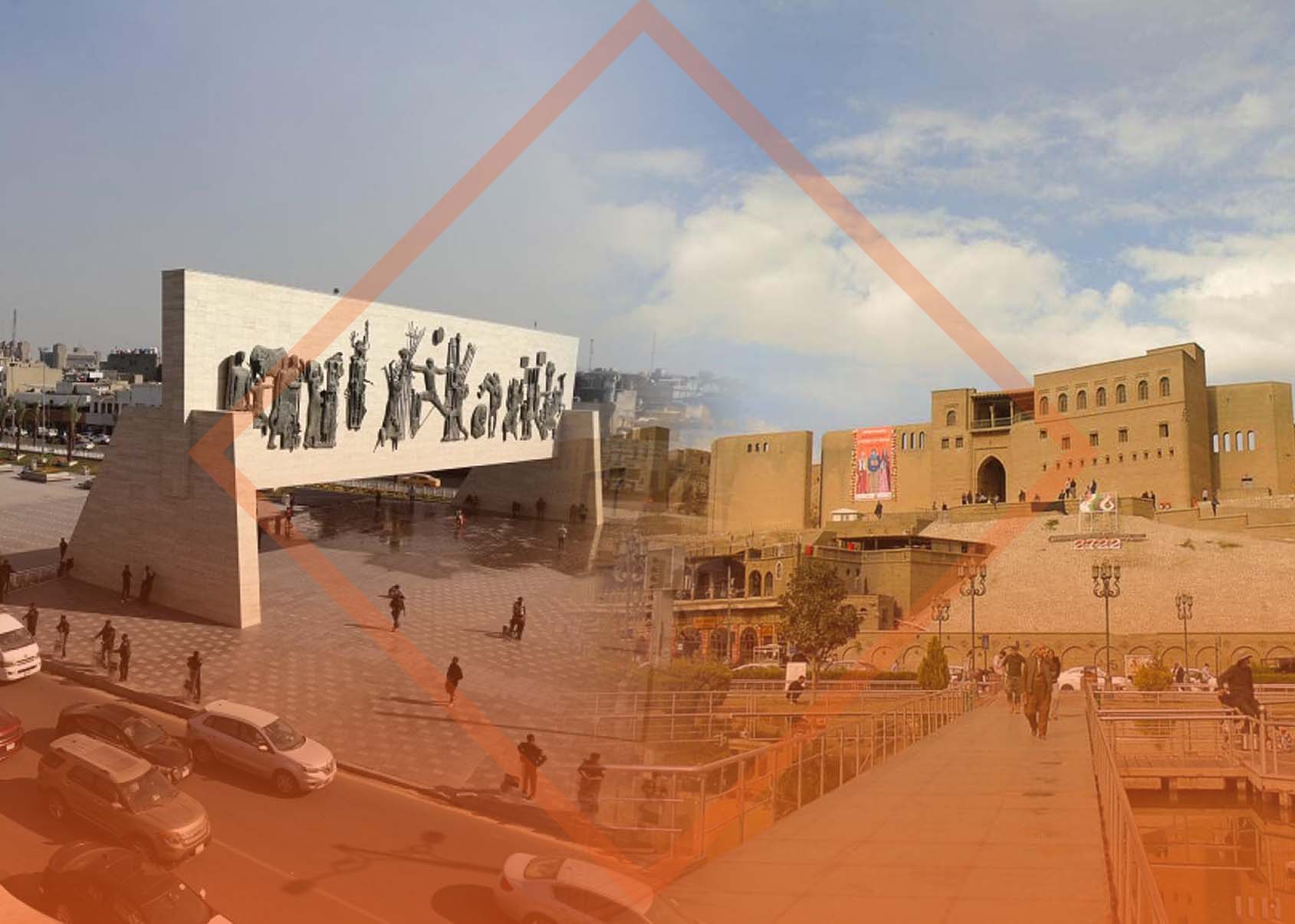Save for later
INTRODUCTION
The autonomous region of Iraqi Kurdistan is among the world’s main oil producers, with more than 20% of the country’s oil reserves 1. Since the American invasion of Iraq in 2003, Iraqi Kurdistan seeks its economic development thanks to its petrol and gas resources. However, the exploitation of these resource is a source of tension between Baghdad’s and Erbil’s authorities, both pursuing an independent oil policy since 2007 2.
It's only on the 4th of April 2023 that an agreement on oil management has been set up between Erbil and Baghdad, putting an end to years-long tensions and conflicts. This agreement has been negotiated under the auspices of the Organization of Petroleum Exporting Countries (OPEC). It aims to clarify the responsibilities of each party in the management of oil and gas resources, as well as to foster a tighter cooperation between them 3. This agreement is considered to be an important step toward the reconciliation in Iraq since it can bring a greater long-term economic stability in Iraq, but doesn’t guarantee a sustainable peace between the ethnic and confessional communities in the region. Indeed, this agreement also raises the question of the role of oil in a fragmented country, both at the confessional and ethnic level. The exploitation of these resources in Iraq has been full of conflict, violence and territorial claims, particularly between the Kurds and the Arabs. Furthermore, the lack of transparency and governance in the oil sector has led to inequalities and economic tensions, including corruption and nepotism accusations. These challenges lead us to inquire about the constructive role of oils for reconciliation of they only reinforce the preexisting ethnic and confessional divisions.
The autonomous region of Iraqi Kurdistan holds important oil and gas reserves, which had enabled Erbil to seek economic development since the American invasion of Iraq in 2003. However, this quest for oil independence has exacerbated the tension between Baghdad’s and Erbil’s authorities, putting to light the preexisting political and ethnic tensions in Iraq. Can we then consider fuel to be a vector of reconciliation in Iraq, or a factor for disintegration in a fragmented country? This complex question should be studied in depth.

I - Oil production in Kurdistan in the light of a growing empowerment process
However, starting the 2000’s, Ankara reappears on the international scene and perceives the emerging empowerment of Iraqi Kurdistan as an opportunity to seize. The territorial fragmentation of the Iraqi and Syrian states, as well as the Arab spring protest waves partly explain the Turkish policy regarding the Kurds as well as its regional ambitions 4. It is a major breaking point concerning the relations between Turkey and the Iraqi and Syrian protagonists, in view of the territorial stakes that represent border connecting Turkey to Iraqi Kurdistan as well as the geopolitical ambitions of other regional and international powers such as Russia, Iran and the United States. The damage of the relations between Ankara and Baghdad leads the Turkish authorities to review the geopolitical positions and reconsider the Kurdish ambitions by recognizing the legitimacy of the Kurdish leader Massoud Barzani. This enables Ankara to reinforce its political and economic influence in the Kurdish regions of Iraq, which are disputed territories abundant with considerable oil reserves. This « race for oil » leads to heavy consequences for Ankara and Washington, both closely following the conflict between Baghdad and Erbil 5.
While Turkey is pursuing a dialogue with the Kurdistan Regional Government of Kurdistan (KRG), America oil companies consider that the resources in Kurdistan are of a crucial importance for American interests in the region. Indeed, ExxonMobil has signed an agreement with the KRG on the 18th of October 2011 for the exploitation of 6 oil reserved in northern Iraq, among which one is in Kirkuk 6. The struggle for the control on oil exports has had a devastating effect on the diplomatic relations between Ankara and Baghdad. It is how, on the 17th of July 2012, Iraq prohibits Turkey to access its aerial space and threatens Ankara to break their business relations with Turkey.
This new agreement between Erbil and Baghdad marks an important turning-point in their relation. It places important measures to reinforce the cooperation between both parties and to resolve the differences that have been opposing them for decades. It’s not only a significant step for the relations between Erbil and Baghdad that have been tense since the unilateral Kurdish declaration of independence in 2017, but it also has important implications for Turkey and its economic and security interests in the region. Ankara, who has long searched to position itself as a staple actor in the region, could cooperate with Erbil and Baghdad in context of this historical agreement, could also mark the start a new era of regional cooperation and stability. The normalization between Erbil and Baghdad could also positively impact Turkey who has long sought to establish tighter relations with Iraqi Kurdistan these last years. Turkey, which has considered the Kurdish people to be a threat to its stability, has progressively adopted a more pragmatic approach by recognizing the need to work with the Kurdish authorities to ensure the security of its southeastern borders and support its booming economy.
Indeed, Turkey is one of the main business partners of Iraqi Kurdistan and plays and important role in its oil exports to world markets. Ankara has also invested in key infrastructure projects such as the development of new pipelines and the construction of hydroelectric dams, essential for the country’s economic growth.
However, in spite of these developments, the relation between Turkey and Iraqi Kurdistan has often been tense because of the Kurdish issue in Turkey and the involvement of the PKK (Kurdistan Workers’ Party) in the fight against the Turkish government. The PKK has instrumentalized Iraq’s Kurdish regions as a support base for its operations, with has angered Ankara and have led to Turkish military strikes against the PKK positions in Iraq. The agreement 4th of April 2023 could mark the turn in the relations between Turkey and Iraqi Kurdistan by offering an opportunity for tighter cooperation in terms of security and economic development. However, it is important to note that many challenges remain, like those regarding the Kurdish issue in Turkey and the presence of the PKK in Iraq.

II - The impact of the Kurdish oil management on the bilateral relations between Erbil and Baghdad
The management of Kurdish oil has had a considerable impact on the relations between Erbil and Baghdad. Indeed, given that the main part of the Iraqi Kurdish economy is dependent on oil, oil wealth has been a central issue in the decision of the Kurdish government to claim its independence. This issue has been shaping the bilateral relations between Baghdad and Erbil since the summer of 2014, when the Islamic State took the control of Kirkuk. The tensions heightened when the Kurds emancipated themselves from the Iraqi authorities and started to export the fuel to Turkey on their own. However, in spite of all these tensions, Erbil and Baghdad have been forced to tighten their relation to defend themselves against Daesh’s threat for the Iraq’s security and its territorial integrity. An agreement has been concluded in 2015 in which the Iraqi minister of oil promised the Kurds to ensure an equitable redistribution of its oil revenues in exchange of the exportation of the Kurdish oil by SOMO, the Iraqi state-owned company. The Kurdish leader Massoud Barzani views the petrol exportation as a key element for Iraqi Kurdistan’s independence and relies on a law voted in 2007 about the Kurdish oil and gas, considered as essential for the development and the prosperity of the autonomous region. However, Baghdad considers this as an endangerment of Iraq’s unity and supports the need of the central government to maintain some kind of authority on the northern territories.
Despite article 111 of the Iraqi constitution stipulating that “Oil and gas are owned by all the people of Iraq in all the regions and governorates.”, as well as article 112 highlighting that “The federal government, with the producing governorates and regional governments, shall undertake the management of oil and gas extracted from present fields”, tensions persisted between both parties. The disagreement has had an important impact on the bilateral relation between Erbil and Baghdad, such as regarding the management and exploitation of Kurdish oil resources. The direct export of oil by Erbil to Turkey have been considered a violation of the Iraqi constitution by the central government, claiming the right to an exclusive management of these resources.
This situation has led to a series of economic and political sanctions imposed by Baghdad to Iraqi Kurdistan, which has in turn had a negative impact on the regional economy and on the relation between the two parties. The new agreement concluded between Erbil and Baghdad could solve the disagreement and improve the bilateral relation. This agreement plans to resume Iraqi Kurdistan’s oil exportation through the Iraqi state, as well as the setup of a revenue sharing system between the two parties. This decision could also restore the trust between Erbil and Baghdad, as well as to stabilize the tensions. It is an important step toward normalization between the two entities. A reinforced cooperation is planned for security, economy and environment. Regarding the oil field, the agreement establishes a ground for cooperation between the two parties for its management and the development, as well as for the exportation of Kurdish oil to Ceyhan’s Turkish port. This agreement is of crucial importance since it ends the tensions between Erbil and Baghdad. It paves the way for a tighter cooperation in many key topics, which could help reinforce the stability in the region. Furthermore, it could enable Iraq to reinforce its position on the international oil scene and grow its oil revenues thanks to Iraqi Kurdistan’s participation.
III- A temporary yet essential agreement
The agreement made between Baghdad’s authorities and Erbil on the 4th of April 2023 has been signed in a context of rising tensions between both parties, following Baghdad’s announcement as well as many other OPEC countries to drastically reduce oil production in Iraqi Kurdistan by May 2023. This agreement states that Kurdish oil exports to Ceyhan will be supervised by both Erbil and Baghdad, and that oil sales will be managed by the state-owned company SOMO, which was previously under that authority of Iraqi Kurdistan. This agreement is a crucial step for tension resolution between Baghdad and Erbil, particularly since Turkey ceased to import Kurdish oil. However, it’s considered as temporary because it will enable to vote a framework law on oil and gas by the Iraqi parliament.
The international chamber of the Paris Commercial Court has recognized the request of the Iraqi government to become the manager of Kurdish oil, affirming the Iraqi sovereignty on the oil resources in Iraqi Kurdistan. In 2014, Baghdad sued Turkey following Ankara’s decision to import oil from Iraqi Kurdistan to Ceyhan. Turkey was accused to violate a bilateral agreement by directly importing Kurdish oil without the authorization of the Iraqi federal government and subsequently had to pay a billion and a half dollars to Iraq.
Finally, the agreement is crucial for the economy of the Iraqi state because it will enable Erbil to send a part of its oil production to Bagdad to market it. Iraq became an ally to some of the OPEC country among which Saudi Arabia, Kuwait and the United Arab Emirates (UAE), in order to have a greater weight in the international negotiations on the production quotas and oil prices.
This agreement, however temporary, could enable the creation of a framework law on oil and gas in Iraq. This new agreement represents a crucial step for the resolution of tensions between Erbil and Baghdad, especially since Turkey has ceased to import Kurdish oil. This agreement will enable oil exports from Iraqi Kurdistan to Ceyhan in Turkey, while ensuring a supervised control by Erbil and Baghdad.
Conclusion
In conclusion, the bilateral agreement between Erbil and Baghdad is benefitting for both Iraqi Kurdistan and Iraq. It enables to reinforce the economic cooperation between the two and also with Ankara, which will contribute to the pacification of the region.
The KRG, owning 20% of the positions inside the Iraqi Kurdistan, manifested its will to exploit this legitimacy since the new agreement, which considerably changes the situation. It could lead to a period of stability for Iraq and for the whole region, unless a major event changes this situation.
However, it reinforces the dependence of Kurdistan on oil exploitation and endangers the sovereignty of Kurdistan on the oil reserves. While this agreement doesn’t solve all of Iraq’s problem since tensions remain between the different political and ethnic factions in the region, the economic, social and security challenges remain important, it’s still a historical step and a great hope for the country’s pacification process. It is then essential that the KRG and the central government of Iraq continues to work together to take on these challenges and achieve a long-term stability.







